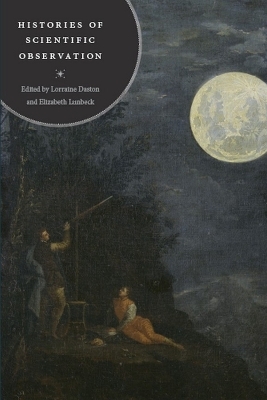
Histories of Scientific Observation
Seiten
2011
University of Chicago Press (Verlag)
978-0-226-13678-3 (ISBN)
University of Chicago Press (Verlag)
978-0-226-13678-3 (ISBN)
Observation is the most pervasive and fundamental practice of all the modern sciences, both natural and human. This collection offers an examination of the history of scientific observation in its own right, as both epistemic category and scientific practice.
Observation is the most pervasive and fundamental practice of all the modern sciences, both natural and human. Its instruments include not only the naked senses but also tools such as the telescope and microscope, the questionnaire, the photographic plate, the notebook, the glassed-in beehive, and myriad other ingenious inventions designed to make the invisible visible, the evanescent permanent, the abstract concrete. Yet observation has almost never been considered as an object of historical inquiry in itself. This wide-ranging collection offers the first examination of the history of scientific observation in its own right, as both epistemic category and scientific practice. "Histories of Scientific Observation" features engaging episodes drawn from across the spectrum of the natural and human sciences, ranging from meteorology, medicine, and natural history to economics, astronomy, and psychology. The contributions spotlight how observers have scrutinized everything - from seaweed to X-ray radiation, household budgets to the emotions - with ingenuity, curiosity, and perseverance verging on obsession.
This book makes a compelling case for the significance of the long, surprising, and epistemologically significant history of scientific observation, a history full of innovations that have enlarged the possibilities of perception, judgment, and reason.
Observation is the most pervasive and fundamental practice of all the modern sciences, both natural and human. Its instruments include not only the naked senses but also tools such as the telescope and microscope, the questionnaire, the photographic plate, the notebook, the glassed-in beehive, and myriad other ingenious inventions designed to make the invisible visible, the evanescent permanent, the abstract concrete. Yet observation has almost never been considered as an object of historical inquiry in itself. This wide-ranging collection offers the first examination of the history of scientific observation in its own right, as both epistemic category and scientific practice. "Histories of Scientific Observation" features engaging episodes drawn from across the spectrum of the natural and human sciences, ranging from meteorology, medicine, and natural history to economics, astronomy, and psychology. The contributions spotlight how observers have scrutinized everything - from seaweed to X-ray radiation, household budgets to the emotions - with ingenuity, curiosity, and perseverance verging on obsession.
This book makes a compelling case for the significance of the long, surprising, and epistemologically significant history of scientific observation, a history full of innovations that have enlarged the possibilities of perception, judgment, and reason.
Lorraine Daston is director of the Max Planck Institute for the History of Science in Berlin and is visiting professor in the Committee on Social Thought at the University of Chicago. Elizabeth Lunbeck is the Nelson Tyrone, Jr. Chair of American History and professor of psychiatry at Vanderbilt University.
| Erscheint lt. Verlag | 15.2.2011 |
|---|---|
| Sprache | englisch |
| Maße | 15 x 23 mm |
| Gewicht | 680 g |
| Themenwelt | Geschichte ► Teilgebiete der Geschichte ► Technikgeschichte |
| Naturwissenschaften | |
| ISBN-10 | 0-226-13678-7 / 0226136787 |
| ISBN-13 | 978-0-226-13678-3 / 9780226136783 |
| Zustand | Neuware |
| Haben Sie eine Frage zum Produkt? |
Mehr entdecken
aus dem Bereich
aus dem Bereich
Buch | Softcover (2024)
Lehmanns Media (Verlag)
CHF 27,90
Digitalisierung neu denken für eine gerechte Gesellschaft
Buch | Hardcover (2023)
Quadriga (Verlag)
CHF 27,95
Vom Perceptron zum Deep Learning
Buch | Softcover (2022)
Springer Vieweg (Verlag)
CHF 27,95


